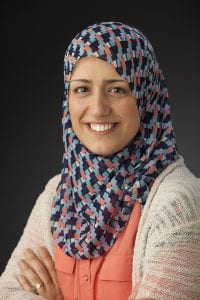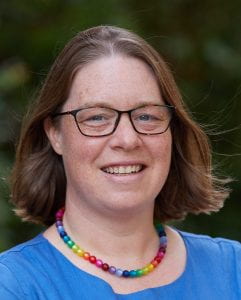
Mashhad Fahes, Ph.D.
Megan Elwood Madden, Ph.D., professor at the School of Geosciences, and Mashhad Fahes, Ph.D., associate professor at the Mewbourne School of Petroleum and Geological Engineering, were awarded rapid response seed grants from the University of Oklahoma Office of Vice President for Research & Partnerships.
Both Fahes and Elwood Madden are part of interdisciplinary teams from across the University that responded to a call for proposals to find compelling ideas to address inequities in the academic research and creative activity enterprise at OU.
Elwood Madden will work with Keri Kornelson, Ph.D. from the College of Arts and Sciences Department of Math for research entitled: Exploring the Intersection of Diversity, Equity and Inclusion Values and Faculty Research Evaluation Processes at OU.
Fahes will work with Amy Cerato, Ph.D., from the Gallogly College of Engineering’s School of College of Civil Engineering and Environmental Sciences, and Georgia Kosmopoulou, Ph.D. from the College of Artis and Sciences Department of Economics. Their research is Mapping Professional Networks and Rewarded Behaviors in Faculty Research Evaluation in STEM Fields at OU.
These seed grants support a larger transdisciplinary proposal effort led by OU faculty Lori Snyder, Ph.D., Carol Silva, Ph.D., and provost Jill Irvine, Ph.D., to submit institutional transformation proposals focused on organizational change for gender equity in STEM academic professions through the National Science Foundation ADVANCE program.
We caught up with Fahes and Elwood Madden to learn more about their research.
Mewbourne College: You responded to a call for research that addresses “inequities in the academic research and creative activity enterprise.” What is the significance of OU requesting research on these subjects from across campus?
Elwood Madden: The call was driven by OU’s recognition that scholars from underrepresented or marginalized groups often face additional hurdles when they are seeking funding and other research support. This research call recognized these historic inequities and put resources behind trying to understand and fix them.
Fahes: Since President Harroz was appointed a little over a year ago, issues around diversity, equity, and inclusion became central in defining OU’s values and goals. He made it his number one priority and said, “if we don’t get this right, nothing else matters.” This call for seed grants is another step in investing OU’s resources towards building capacity in this area. It reaffirms in a concrete way that OU is serious about the need for more work in this domain and the need to rally more faculty members to participate in this effort.
Mewbourne College: What sort of meaningful change could it create for faculty, students and research as a whole?
Elwood Madden: The call provided a mechanism to explicitly support research that addresses these inequities. It is, to my knowledge, the first time such inequities have been explicitly recognized by the University. Recognizing and acknowledging a problem is the first step needed to fix it.
Fahes: I agree with Dr. Elwood Madden that this step of acknowledging the existence of a problem is the first step towards fixing it. What this means to OU faculty, students, and researchers is a first step towards creating an inclusive culture that welcomes everyone and values all the impactful contributions that they bring to the table in an academic setting. The result will be a diverse community that is rich with creative ideas and innovative approaches that will allow OU to achieve higher standards of excellence.
Mewbourne College: Please explain more about your grant and the expertise your collaborators from across campus bring to the research.
Elwood Madden: Keri Kornelson and I are working on a project aimed at studying how different units on our campus recognize, categorize, and value different types of research and creative activities, especially collaborative and interdisciplinary activities and activities aimed at addressing or studying diversity, equity, and inclusion issues. We say we want faculty to be collaborative and work on interdisciplinary projects, but do we value these efforts when it comes time for evaluation? Over the past two years, Pres. Harroz has said that diversity, equity, and inclusion is his first priority, but are we valuing faculty efforts to address these issues?
Dr. Kornelson is in Math and has worked in the College of Arts and Science’s dean’s office supporting faculty research, so she has experience from the administrative side. She also has experience with survey-based research to address inequities. We are also both members of the Faculty Senate executive committee, where we are exposed to different cultures and practices of evaluation across campus. We are developing a survey and a series of interviews to try to learn more from departments across campus.
Fahes: Amy Cerato, Georgia Kosmopoulou, and I are working on a project that has two dimensions. We will be analyzing the annual evaluation scores of faculty (using de-identified data) on teaching, research, and service of more than 30 departments on the OU campus. The goal is to study the standard deviations on these scores and identify any statistically significant variations in these numbers across gender and race.
The hypothesis, based on literature, is that service scores across many departments have a very small standard deviation compared to research scores, which in many cases has a differential negative impact on faculty members from underrepresented groups. The results will be compared to the analysis we will perform on the characteristics of research networks of OU faculty. Mapping the results of research evaluation scores to the characteristics of research networks can reveal a structural bias in research evaluations which could undermine the diverse ways in which faculty approach and build research collaborations.
Mewbourne College: What does your team hope to learn?
Elwood Madden: We want to learn how different units value DEI work and collaborative/interdisciplinary projects when they evaluate faculty research efforts.
Fahes: We want to quantify the differential impact of evaluation strategies at various departments at OU for research, teaching, and service on faculty across gender and race identities. This will help pinpoint the areas that require further work towards making the evaluation system more inclusive and equitable.
Mewbourne College: How does this research relate to or impact your area of research in geosciences/petroleum engineering?
Elwood Madden: Geoscience departments across the country have some of the lowest levels of racial diversity, even compared to other STEM departments. I hope that this research will provide new ideas for how we can better recognize and reward diversity-, equity-, and inclusion-focused work in our department, to help make our department more welcoming, supportive, and inclusive.
Fahes: The same applies to petroleum engineering, where the number of female faculty at OU is less than half the national average for petroleum engineering faculty. In addition, our discipline also has the absence of representative racial diversity at both the faculty and student level.
If we, as faculty in petroleum engineering, do not do this work and attempt to identify and solve the problems, then who will?
When we look around the table and we see the lack of diversity, and then we identify that there is a problem that requires a solution, we should make sure that the effort it takes to do that work is recognized and valued across all faculty evaluation criteria, instead of actually punishing the faulty who take on this responsibility. The goal is that this work will eventually lead to incentivizing more faculty members to participate in these efforts because that’s the only way we have any hope of moving the needle.
Mewbourne College: Often educational disciplines are siloed. What benefit have you gained from collaborating with experts in other disciplines?
Elwood Madden: I learn so much every day working with people across campus. There are lots of good ideas and different ways of doing things in other departments. I love learning and sharing ideas and practices with people from other departments and disciplines.
Fahes: I recall in one weekly learning community, one of the engineering faculty asked a question that puzzled all of us, and we happened to have in that group a faculty member from sociology who said “I teach that topic in my class!” She shared with us the publication she discusses with her students and we took it on as our reading for the following week. It is rare to have an engineering faculty member who is also an expert in research related to people and behaviors. This applies to DEI work, where instead of reinventing the wheel, we just need to open our minds and time to conversations with those who do this for their scholarship. This can also be applied to teaching methods, teamwork, building motivation, optimizing student learning, and many more topics relevant to the job of faculty members that we mostly approach from a trial-and-error perspective as we keep trying to reinvent the wheel.
Mewbourne College: How can students, faculty and staff, and alumni work together to create a more inclusive environment?
Elwood Madden: We need to first recognize and acknowledge that we have a problem. Then we need to work together to fix it. This means deliberately using inclusive rather than exclusive or demeaning language. We have students, faculty, and staff from a wide range of backgrounds who also have a wide range of goals in science, engineering, academia, business, public service, etc. We should be supporting all of them, recognizing the value of their contributions and helping them reach those goals.
We can also work to recognize and reward ALL types of research excellence. In the past, grant dollars and number of publications were the sole measure of research value. We can do better than that. What is the impact of the research? How many students or early career researchers were involved? Novel research, whether funded or unfunded, should be recognized and celebrated – It should not just be about the money.
Fahes: Mewbourne College is providing a lot of learning opportunities for our faculty, staff, and students, as well as our alumni. We all have a role to play in this area, and we all still have a lot to learn. Dean Stice said in his address to the College community that his goal is to get 100% participation of faculty and staff in diversity, equity, and inclusion training. This messaging from upper administration is important so that our college community recognizes this expectation and starts to feel the weight of this problem and the critical role and responsibility they individually have in this area.
To learn more about Mewbourne College’s diversity, equity and inclusion initiatives, please visit: https://www.ou.edu/mcee/student_services/diversity
